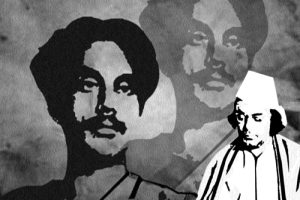Remembering Kazi Nazrul Islam: The Rebel Poet’s Enduring Flame

Each year, on the death anniversary of Kazi Nazrul Islam, we are reminded of the unique voice that shook the conscience of Bengal and beyond. Known as the “Bidrohi Kobi” or Rebel Poet, Nazrul’s life and works embodied a restless spirit against oppression, inequality, and narrow divisions. Although decades have passed since his death in 1976, his words still burn with the same urgency, challenging us to examine the soul of our society and question whether we have lived up to his vision.
A Voice of Defiance and Liberation
Nazrul’s poetry was never confined to ornamentation or romantic longing alone. At a time when British colonialism gripped India, his pen thundered with resistance. In his verses, such as Bidrohi and Dhumketu, he became a fiery symbol of freedom and courage. He stood uncompromisingly against tyranny—whether it came from imperial rulers, exploitative elites, or dogmatic traditions. In this sense, Nazrul was not just a poet, but a revolutionary torchbearer who sought to awaken the masses.
Beyond Politics: The Poet of Humanity
Yet, Nazrul was far more than a poet of rebellion. His songs and essays carried a vision of unity in a deeply divided land. He spoke equally against communalism and sectarianism, insisting that Hindus and Muslims were threads of the same fabric. He infused his songs with verses from the Qur’an and the Gita alike, breaking boundaries that sought to separate people. For a Bengal often torn by religious strife, Nazrul remains a moral compass—reminding us that freedom is incomplete without harmony and justice.

The Tragic Silence
Nazrul’s later life was marked by profound silence due to illness, as he battled a debilitating neurological disorder. For over three decades, the rebel voice that once shook empires lay silent. This silence was itself a painful metaphor for a society that too often neglects its prophets in their lifetime. But his physical decline could not extinguish the resonance of his words, which continue to inspire generations in Bangladesh, India, and the world.
Relevance in Our Times
On his death anniversary, we must ask ourselves: have we honored Nazrul’s legacy? Inequality persists, communal tensions resurface, and freedom often bends under the weight of political and economic oppression. Nazrul’s call to arms—against injustice, against division, against indifference—is as relevant today as it was in the early 20th century. His poetry demands not only admiration, but action.
A Living Legacy
Nazrul Islam was not a poet to be remembered solely in nostalgia. He was a voice of eternal resistance, compassion, and human dignity. To truly honor him, we must carry forward his dream of a just, equal, and harmonious society. His songs should not only echo in cultural events but inspire collective action in our streets, our policies, and our daily lives.
As we bow our heads on his death anniversary, let us remember: Kazi Nazrul Islam did not merely write poetry—he lived it, fought for it, and left it as a guiding flame for us all. The question is not whether Nazrul lives in our memory, but whether his rebellious spirit lives in our actions.












